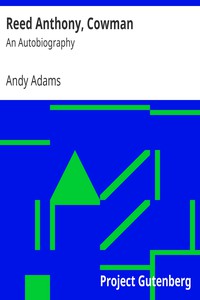Reed Anthony, Cowman: An Autobiography by Andy Adams (13 inch ebook reader .txt) 📕

Read free book «Reed Anthony, Cowman: An Autobiography by Andy Adams (13 inch ebook reader .txt) 📕» - read online or download for free at americanlibrarybooks.com
- Author: Andy Adams
Read book online «Reed Anthony, Cowman: An Autobiography by Andy Adams (13 inch ebook reader .txt) 📕». Author - Andy Adams
We all looked upon him as one of the family, and I employed the best of counsel. The circumstances were against him, however, and in spite of an able defense he received a sentence of ten years. No one questioned the justice of the verdict, the law must be upheld, and the poor fellow was taken to the penitentiary to serve out the sentence. My wife and I concealed the facts from the younger children, who were constantly inquiring after his return, especially my younger girls, with whom he was a great favorite. The incident was worse than a funeral; it would not die out, as never a day passed but inquiry was made after the missing man; the children dreamed about him, and awoke from their sleep to ask if he had come and if he had brought them anything. The matter finally affected my wife's nerves, the older boys knew the truth, and the younger children were becoming suspicious of the veracity of their parents. The truth was gradually leaking out, and after he had served a year in prison, I began a movement with the view of securing his pardon. My influence in state politics was always more or less courted, and appealing to my friends, I drew up a petition, which was signed by every prominent politician in that section, asking that executive clemency be extended in behalf of my old foreman. The governor was a good friend of mine, anxious to render me a service, and through his influence we managed to have the sentence so reduced that after serving two years the prisoner was freed and returned to the ranch. He was the same lovable character, tolerated by my wife and fondled by the children, and he refused to leave home for over a year. Ever cautious to remove temptation from him, both my wife and I hoped that the lesson would last him through life, but in an unguarded hour he took to drink, and shot to death his dearest friend.
For the second offense he received a life sentence. My regret over securing his pardon, and the subsequent loss of human life, affected me as no other event has ever done in my career. This man would have died for me or one of mine, and what I thought to be a generous act to a man in prison proved a curse that haunted me for many years. But all is well now between us. I make it a point to visit him at least once a year; we have talked the matter over and have come to the conclusion that the law is just and that he must remain in confinement the remainder of his days. That is now the compact, and, strange to say, both of us derive a sense of security and peace from our covenant such as we had never enjoyed during the year of his liberty. The wardens inform me that he is a model prisoner, perfectly content in his restraint; and I have promised him that on his death, whether it occurs before or after mine, his remains will be brought back to the home ranch and be given a quiet grave in some secluded spot.
For any success that I may have achieved, due acknowledgment must be given my helpmate. I was blessed with a wife such as falls to the lot of few men. Once children were born to our union and a hearthstone established, the family became the magnet of my life. It mattered not where my occupation carried me, or how long my absence from home, the lodestar of a wife and family was a sustaining help. Our first cabin, long since reduced to ashes, lives in my memory as a palace. I was absent at the time of its burning, but my wife's father always enjoyed telling the story on his daughter. The elder Edwards was branding calves some five miles distant from the home ranch, but on sighting the signal smoke of the burning house, he and his outfit turned the cattle loose, mounted their horses, and rode to the rescue at a break-neck pace. When they reached the scene our home was enveloped in flames, and there was no prospect of saving any of its contents. The house stood some distance from the other ranch buildings, and as there was no danger of the fire spreading, there was nothing that could be done and the flames held undisputed sway. The cause of the fire was unknown, my wife being at her father's house at the time; but on discovering the flames, she picked up the baby and ran to the burning cabin, entered it and rescued the little tin trunk that held her girlhood trinkets and a thousand certificates of questionable land scrip. When the men dashed up, my wife was sitting on the tin trunk, surrounded by the children, all crying piteously, fully unconscious of the fact that she had saved the foundation of my present landed holdings. The cabin had cost two weeks' labor to build, its contents were worthless, but I had no record of the numbers of the certificates, and to my wife's presence of mind or intuition in an emergency all credit is given for saving the land scrip. Many daughters have done virtuously, but thou excellest them all. The compiling of these memoirs has been a pleasant task. In this summing-up of my active life, much has been omitted; and then again, there seems to have been a hopeless repetition with the recurring years, for seedtime and harvest come to us all as the seasons roll round. Four of my boys have wandered far afield, forging out for themselves, not content to remain under the restraint of older brothers who have assumed the active management of my ranches. One bad general is still better than two good ones, and there must be a head to a ranch if it is to be made a success. I still keep an eye over things, but the rough, hard work now falls on younger shoulders, and I find myself delegated to amuse and be amused by the third generation of the Anthonys. In spite of my years, I still enjoy a good saddle horse, scarcely a day passing but I ride from ten to twenty miles. There is a range maxim that "the eyes of the boss make a fat horse," and at deliveries of cattle, rounds-ups, and branding, my mere presence makes things move with alacrity. I can still give the boys pointers in handling large bodies of cattle, and the ranch outfits seem to know that we old-time cowmen have little use for the modern picturesque cowboy, unless he is an all-round man and can deliver the goods in any emergency.
With but a few years of my allotted span yet to run, I find myself in the full enjoyment of all my faculties, ready for a romp with my grandchildren or to crack a joke with a friend. My younger girls are proving splendid comrades, always ready for a horseback ride or a trip to the city. It has always been a characteristic of the Anthony family that they could ride a horse before they could walk, and I find the third generation following in the footsteps of their elders. My grandsons were all expert with a rope before they could read, and it is one of the evidences of a merciful providence that their lives have been spared, as it is nearly impossible to keep them out of mischief and danger. To forbid one to ride a certain dangerous horse only serves to heighten his anxiety to master the outlaw, and to banish him from the branding pens means a prompt return with or without an excuse. On one occasion, on the Double Mountain ranch, with the corrals full of heavy cattle, I started down to the pens, but met two of my grandsons coming up the hill, and noticed at a glance that there had been trouble. I stopped the boys and inquired the cause of their tears, when the youngest, a barefooted, chubby little fellow, said to me between his sobs, "Grandpa, you'd—you'd—you'd better keep away from those corrals. Pa's as mad as a hornet, and—and—and he quirted us—yes, he did. If you fool around down there, he'll—he'll—he'll just about wear you out."
Should this transcript of my life ever reach the dignity of publication, the casual reader, in giving me any credit for success, should bear in mind the opportunities of my time. My lot was cast with the palmy days of the golden West, with its indefinable charm, now past and gone and never to return. In voicing this regret, I desire to add that my mistakes are now looked back to as the chastening rod, leading me to an appreciation of higher ideals, and the final testimony that life is well worth the living.





Comments (0)